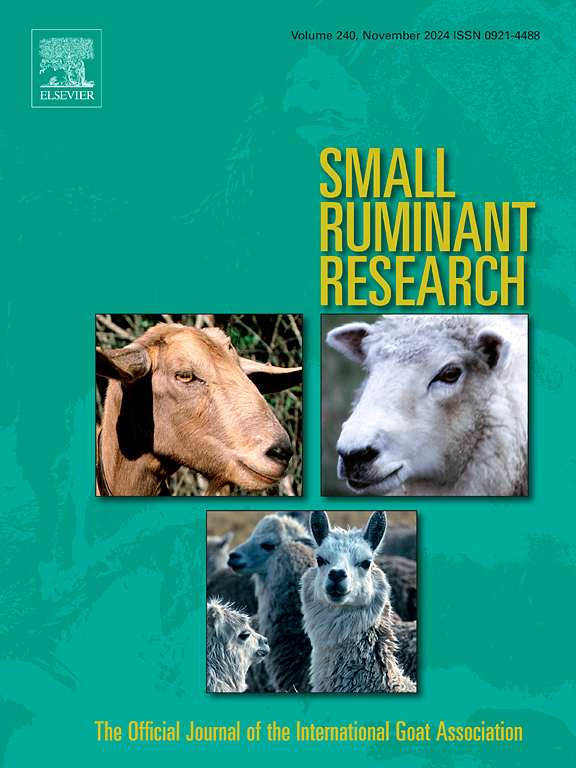小型反刍动物膳食中补充类黄酮的元分析:生长性能、抗氧化状态、营养消化率、瘤胃发酵和肉质
IF 1.6
3区 农林科学
Q2 AGRICULTURE, DAIRY & ANIMAL SCIENCE
引用次数: 0
摘要
本研究旨在通过荟萃分析法评估日粮中补充类黄酮对小型反刍动物生长性能、抗氧化状态、营养物质消化率、瘤胃发酵和肉质的影响。荟萃分析所使用的数据摘自按照 PRISMA 方法通过系统搜索确定的 29 篇科学文章。采用 Der-Simonian 和 Laird 随机效应模型,利用加权平均差评估效应大小。日粮中添加黄酮类化合物可提高(P < 0.05)干物质摄入量、平均日增重、热胴体重量、热胴体产量、背长肌面积和背膘厚度。相比之下,饲料转化率在日粮补充黄酮后有所下降(P <0.05)。日粮中补充黄酮类化合物会增加(P <0.001)血清中超氧化物歧化酶、过氧化氢酶、谷胱甘肽过氧化物酶和总抗氧化能力的浓度,但会降低(P <0.001)血清中丙二醛(MDA)的浓度。干物质、有机物质、粗蛋白质、中性洗涤纤维和酸性洗涤纤维的消化率随着日粮中黄酮类化合物的补充而增加(P <0.05)。日粮中添加黄酮类化合物可降低瘤胃中的氨氮浓度(P <0.001),提高瘤胃中的总挥发性脂肪酸和乙酸浓度(P <0.001)。日粮中添加黄酮类化合物可降低(P < 0.001)肉的蒸煮损失、剪切力和 MDA。总之,日粮中补充黄酮类化合物可作为一种营养策略来改善小型反刍动物的生长性能、血清中的抗氧化剂状况、营养物质消化率、瘤胃发酵和肉质。本文章由计算机程序翻译,如有差异,请以英文原文为准。
Meta-analysis of dietary supplementation with flavonoids in small ruminants: Growth performance, antioxidant status, nutrient digestibility, ruminal fermentation, and meat quality
This study aimed to evaluate the effects of dietary supplementation with flavonoids on growth performance, antioxidant status, nutrient digestibility, ruminal fermentation, and meat quality of small ruminants through a meta-analytic approach. The data used in the meta-analysis were extracted from 29 scientific articles identified through systematic searches following the PRISMA methodology. Der-Simonian and Laird, random effects models, were used to assess effect sizes using weighted mean differences. Dietary supplementation with flavonoids increased (P < 0.05) dry matter intake, average daily gain, hot carcass weight, hot carcass yield, Longissimus dorsi muscle area, and backfat thickness. In contrast, the feed conversion ratio decreased (P < 0.05) in response to dietary flavonoid supplementation. Dietary supplementation with flavonoids increased (P < 0.001) the serum concentration of superoxide dismutase, catalase, glutathione peroxidase, and total antioxidant capacity but decreased (P < 0.001) the serum concentration of malondialdehyde (MDA). The digestibility of dry matter, organic matter, crude protein, neutral detergent fiber, and acid detergent fiber increased (P < 0.05) in response to dietary flavonoid supplementation. Dietary supplementation with flavonoids decreased (P < 0.001) the ruminal concentration of ammonia nitrogen and increased (P < 0.001) the ruminal concentration of total volatile fatty acids and acetate. Dietary supplementation with flavonoids decreased (P < 0.001) cooking loss, shear force, and MDA in meat. In conclusion, dietary supplementation with flavonoids can be used as a nutritional strategy to improve growth performance, antioxidant status in blood serum, nutrient digestibility, ruminal fermentation, and meat quality in small ruminants.
求助全文
通过发布文献求助,成功后即可免费获取论文全文。
去求助
来源期刊

Small Ruminant Research
农林科学-奶制品与动物科学
CiteScore
3.10
自引率
11.10%
发文量
210
审稿时长
12.5 weeks
期刊介绍:
Small Ruminant Research publishes original, basic and applied research articles, technical notes, and review articles on research relating to goats, sheep, deer, the New World camelids llama, alpaca, vicuna and guanaco, and the Old World camels.
Topics covered include nutrition, physiology, anatomy, genetics, microbiology, ethology, product technology, socio-economics, management, sustainability and environment, veterinary medicine and husbandry engineering.
 求助内容:
求助内容: 应助结果提醒方式:
应助结果提醒方式:


